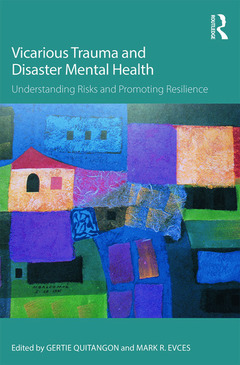Vicarious Trauma and Disaster Mental Health Understanding Risks and Promoting Resilience Psychosocial Stress Series
Coordonnateurs : Quitangon Gertie, Evces Mark R.

Vicarious Trauma and Disaster Mental Health focuses on the clinician and the impact of working with disaster survivors. Floods, hurricanes, tornadoes, mass shootings, terrorism and other large-scale catastrophic events have increased in the last decade and disaster resilience has become a national imperative. This book explores vicarious traumatization in mental health providers who respond to massive disasters by choice or by circumstance. What happens when clinicians share the trauma and vulnerability from the toll taken by a disaster with the victims they care for? How can clinicians increase resilience from disaster exposure and provide mental health services effectively? Vicarious Trauma and Disaster Mental Health offers insight and analysis of the research and theory behind vicarious trauma and compares and contrasts with other work-impact concepts such as burnout, compassion fatigue and secondary traumatic stress. It proposes practical evidence-informed personal strategies and organizational approaches that address five cognitive schemas (safety, esteem, trust, control and intimacy) disrupted in vicarious trauma. With an emphasis on the psychological health and safety of mental health providers in the post-disaster workplace, this book represents a shift in perspective and provides a framework for the promotion of worker resilience in the standard of practice in disaster management.
Series Editor Foreword Figley Introduction I. Understanding Vicarious Trauma 1. What is vicarious trauma Evces 2. What factors can predict susceptibility to vicarious trauma Quitangon, St. Cyr, Nelson 3. What are the barriers to addressing vicarious trauma? Hammerslough II. Understanding Disasters 4. What do we need to know about disasters? Quitangon 5. How different is Psychological First Aid from other psychotherapeutic modalities? Watson 6. How do we understand disaster-related vicarious trauma, secondary traumatic stress and compassion fatigue? Naturale III. Understanding Vicarious Resilience 7. What Is vicarious resilience? Nelson, St. Cyr 8. What factors are associated with vicarious resilience? Nelson, St. Cyr 9. What are there positive effects from working with victims of trauma? Nelson, St. Cyr IV. Managing Vicarious Trauma in Disasters 10. How do we measure vicarious trauma? St. Cyr 11. How can we rescue ourselves from vicarious trauma? Kaplan 12. What can organizations do to address vicarious trauma in disasters? Quitangon, Evces V. Navigating Resources on Vicarious Trauma and Disaster 13. What resources are available on vicarious trauma? Iqbal, Lavy, Evces 14. How do we navigate relevant information on disasters? Ryu, Lavy, Evces Appendix Index
Gertie Quitangon, M.D., is a clinical assistant professor of psychiatry at the New York University School of Medicine and is on faculty at the NYU Public Psychiatry Fellowship. She is currently the Medical Director at Chapel Street Center, a community-based outpatient clinic of the Department of Veterans Affairs New York Harbor Healthcare System.
Mark R. Evces, Ph.D., is a clinical instructor of psychiatry at the New York University School of Medicine and Assistant Director of mental health at the WTC Health Program NYU School of Medicine Clinical Center of Excellence.
.
Date de parution : 02-2015
15.2x22.9 cm
Date de parution : 02-2015
15.2x22.9 cm
Disponible chez l'éditeur (délai d'approvisionnement : 14 jours).
Prix indicatif 251,01 €
Ajouter au panierThème de Vicarious Trauma and Disaster Mental Health :
Mots-clés :
Figley; Quitangon; Evces; Trauma; Disaster; Mental Health; disaster relief; Disaster Mental Health; Secondary Traumatic Stress Scale; Health Risk Appraisal; American Psychiatric Association; Compassion Satisfaction Subscale; Trauma Specific Training; Disaster Behavioral Health; Indirect Trauma Exposure; FEMA; Emotional Exhaustion; Human Suffering; Disaster Mental Health Work; Disaster Mental Health Response; Vicarious Trauma; Secondary Traumatic Stress; National Child Traumatic Stress Network; Vicarious Resilience; Burnout Subscale; Attachment Belief Scale; Lower Item Scale Correlations; OSH Intervention; MSW Practitioner; Disaster Relief Workers; Traumatic Stress Symptomatology; Intrusion Subscale



